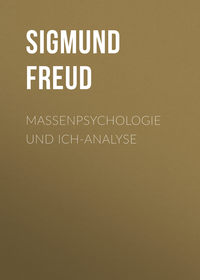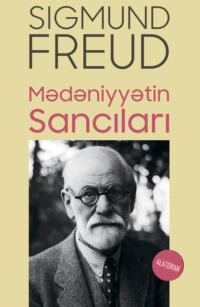 полная версия
полная версияDream Psychology: Psychoanalysis for Beginners
The essential content which stood out clearly and broadly in the dream must, after analysis, rest satisfied with a very subordinate rôle among the dream thoughts. These very dream thoughts which, going by my feelings, have a claim to the greatest importance are either not present at all in the dream content, or are represented by some remote allusion in some obscure region of the dream. I can thus describe these phenomena: During the dream work the psychical intensity of those thoughts and conceptions to which it properly pertains flows to others which, in my judgment, have no claim to such emphasis. There is no other process which contributes so much to concealment of the dream's meaning and to make the connection between the dream content and dream ideas irrecognizable. During this process, which I will call the dream displacement, I notice also the psychical intensity, significance, or emotional nature of the thoughts become transposed in sensory vividness. What was clearest in the dream seems to me, without further consideration, the most important; but often in some obscure element of the dream I can recognize the most direct offspring of the principal dream thought.
I could only designate this dream displacement as the transvaluation of psychical values. The phenomena will not have been considered in all its bearings unless I add that this displacement or transvaluation is shared by different dreams in extremely varying degrees. There are dreams which take place almost without any displacement. These have the same time, meaning, and intelligibility as we found in the dreams which recorded a desire. In other dreams not a bit of the dream idea has retained its own psychical value, or everything essential in these dream ideas has been replaced by unessentials, whilst every kind of transition between these conditions can be found. The more obscure and intricate a dream is, the greater is the part to be ascribed to the impetus of displacement in its formation.
The example that we chose for analysis shows, at least, this much of displacement – that its content has a different center of interest from that of the dream ideas. In the forefront of the dream content the main scene appears as if a woman wished to make advances to me; in the dream idea the chief interest rests on the desire to enjoy disinterested love which shall "cost nothing"; this idea lies at the back of the talk about the beautiful eyes and the far-fetched allusion to "spinach."
If we abolish the dream displacement, we attain through analysis quite certain conclusions regarding two problems of the dream which are most disputed – as to what provokes a dream at all, and as to the connection of the dream with our waking life. There are dreams which at once expose their links with the events of the day; in others no trace of such a connection can be found. By the aid of analysis it can be shown that every dream, without any exception, is linked up with our impression of the day, or perhaps it would be more correct to say of the day previous to the dream. The impressions which have incited the dream may be so important that we are not surprised at our being occupied with them whilst awake; in this case we are right in saying that the dream carries on the chief interest of our waking life. More usually, however, when the dream contains anything relating to the impressions of the day, it is so trivial, unimportant, and so deserving of oblivion, that we can only recall it with an effort. The dream content appears, then, even when coherent and intelligible, to be concerned with those indifferent trifles of thought undeserving of our waking interest. The depreciation of dreams is largely due to the predominance of the indifferent and the worthless in their content.
Analysis destroys the appearance upon which this derogatory judgment is based. When the dream content discloses nothing but some indifferent impression as instigating the dream, analysis ever indicates some significant event, which has been replaced by something indifferent with which it has entered into abundant associations. Where the dream is concerned with uninteresting and unimportant conceptions, analysis reveals the numerous associative paths which connect the trivial with the momentous in the psychical estimation of the individual. It is only the action of displacement if what is indifferent obtains recognition in the dream content instead of those impressions which are really the stimulus, or instead of the things of real interest. In answering the question as to what provokes the dream, as to the connection of the dream, in the daily troubles, we must say, in terms of the insight given us by replacing the manifest latent dream content: The dream does never trouble itself about things which are not deserving of our concern during the day, and trivialities which do not trouble us during the day have no power to pursue us whilst asleep.
What provoked the dream in the example which we have analyzed? The really unimportant event, that a friend invited me to a free ride in his cab. The table d'hôte scene in the dream contains an allusion to this indifferent motive, for in conversation I had brought the taxi parallel with the table d'hôte. But I can indicate the important event which has as its substitute the trivial one. A few days before I had disbursed a large sum of money for a member of my family who is very dear to me. Small wonder, says the dream thought, if this person is grateful to me for this – this love is not cost-free. But love that shall cost nothing is one of the prime thoughts of the dream. The fact that shortly before this I had had several drives with the relative in question puts the one drive with my friend in a position to recall the connection with the other person. The indifferent impression which, by such ramifications, provokes the dream is subservient to another condition which is not true of the real source of the dream – the impression must be a recent one, everything arising from the day of the dream.
I cannot leave the question of dream displacement without the consideration of a remarkable process in the formation of dreams in which condensation and displacement work together towards one end. In condensation we have already considered the case where two conceptions in the dream having something in common, some point of contact, are replaced in the dream content by a mixed image, where the distinct germ corresponds to what is common, and the indistinct secondary modifications to what is distinctive. If displacement is added to condensation, there is no formation of a mixed image, but a common mean which bears the same relationship to the individual elements as does the resultant in the parallelogram of forces to its components. In one of my dreams, for instance, there is talk of an injection with propyl. On first analysis I discovered an indifferent but true incident where amyl played a part as the excitant of the dream. I cannot yet vindicate the exchange of amyl for propyl. To the round of ideas of the same dream, however, there belongs the recollection of my first visit to Munich, when the Propylœa struck me. The attendant circumstances of the analysis render it admissible that the influence of this second group of conceptions caused the displacement of amyl to propyl. Propyl is, so to say, the mean idea between amyl and propylœa; it got into the dream as a kind of compromise by simultaneous condensation and displacement.
The need of discovering some motive for this bewildering work of the dream is even more called for in the case of displacement than in condensation.
Although the work of displacement must be held mainly responsible if the dream thoughts are not refound or recognized in the dream content (unless the motive of the changes be guessed), it is another and milder kind of transformation which will be considered with the dream thoughts which leads to the discovery of a new but readily understood act of the dream work. The first dream thoughts which are unravelled by analysis frequently strike one by their unusual wording. They do not appear to be expressed in the sober form which our thinking prefers; rather are they expressed symbolically by allegories and metaphors like the figurative language of the poets. It is not difficult to find the motives for this degree of constraint in the expression of dream ideas. The dream content consists chiefly of visual scenes; hence the dream ideas must, in the first place, be prepared to make use of these forms of presentation. Conceive that a political leader's or a barrister's address had to be transposed into pantomime, and it will be easy to understand the transformations to which the dream work is constrained by regard for this dramatization of the dream content.
Around the psychical stuff of dream thoughts there are ever found reminiscences of impressions, not infrequently of early childhood – scenes which, as a rule, have been visually grasped. Whenever possible, this portion of the dream ideas exercises a definite influence upon the modelling of the dream content; it works like a center of crystallization, by attracting and rearranging the stuff of the dream thoughts. The scene of the dream is not infrequently nothing but a modified repetition, complicated by interpolations of events that have left such an impression; the dream but very seldom reproduces accurate and unmixed reproductions of real scenes.
The dream content does not, however, consist exclusively of scenes, but it also includes scattered fragments of visual images, conversations, and even bits of unchanged thoughts. It will be perhaps to the point if we instance in the briefest way the means of dramatization which are at the disposal of the dream work for the repetition of the dream thoughts in the peculiar language of the dream.
The dream thoughts which we learn from the analysis exhibit themselves as a psychical complex of the most complicated superstructure. Their parts stand in the most diverse relationship to each other; they form backgrounds and foregrounds, stipulations, digressions, illustrations, demonstrations, and protestations. It may be said to be almost the rule that one train of thought is followed by its contradictory. No feature known to our reason whilst awake is absent. If a dream is to grow out of all this, the psychical matter is submitted to a pressure which condenses it extremely, to an inner shrinking and displacement, creating at the same time fresh surfaces, to a selective interweaving among the constituents best adapted for the construction of these scenes. Having regard to the origin of this stuff, the term regression can be fairly applied to this process. The logical chains which hitherto held the psychical stuff together become lost in this transformation to the dream content. The dream work takes on, as it were, only the essential content of the dream thoughts for elaboration. It is left to analysis to restore the connection which the dream work has destroyed.
The dream's means of expression must therefore be regarded as meager in comparison with those of our imagination, though the dream does not renounce all claims to the restitution of logical relation to the dream thoughts. It rather succeeds with tolerable frequency in replacing these by formal characters of its own.
By reason of the undoubted connection existing between all the parts of dream thoughts, the dream is able to embody this matter into a single scene. It upholds a logical connection as approximation in time and space, just as the painter, who groups all the poets for his picture of Parnassus who, though they have never been all together on a mountain peak, yet form ideally a community. The dream continues this method of presentation in individual dreams, and often when it displays two elements close together in the dream content it warrants some special inner connection between what they represent in the dream thoughts. It should be, moreover, observed that all the dreams of one night prove on analysis to originate from the same sphere of thought.
The causal connection between two ideas is either left without presentation, or replaced by two different long portions of dreams one after the other. This presentation is frequently a reversed one, the beginning of the dream being the deduction, and its end the hypothesis. The direct transformation of one thing into another in the dream seems to serve the relationship of cause and effect.
The dream never utters the alternative "either-or," but accepts both as having equal rights in the same connection. When "either-or" is used in the reproduction of dreams, it is, as I have already mentioned, to be replaced by "and."
Conceptions which stand in opposition to one another are preferably expressed in dreams by the same element.2 There seems no "not" in dreams. Opposition between two ideas, the relation of conversion, is represented in dreams in a very remarkable way. It is expressed by the reversal of another part of the dream content just as if by way of appendix. We shall later on deal with another form of expressing disagreement. The common dream sensation of movement checked serves the purpose of representing disagreement of impulses – a conflict of the will.
Only one of the logical relationships – that of similarity, identity, agreement– is found highly developed in the mechanism of dream formation. Dream work makes use of these cases as a starting-point for condensation, drawing together everything which shows such agreement to a fresh unity.
These short, crude observations naturally do not suffice as an estimate of the abundance of the dream's formal means of presenting the logical relationships of the dream thoughts. In this respect, individual dreams are worked up more nicely or more carelessly, our text will have been followed more or less closely, auxiliaries of the dream work will have been taken more or less into consideration. In the latter case they appear obscure, intricate, incoherent. When the dream appears openly absurd, when it contains an obvious paradox in its content, it is so of purpose. Through its apparent disregard of all logical claims, it expresses a part of the intellectual content of the dream ideas. Absurdity in the dream denotes disagreement, scorn, disdain in the dream thoughts. As this explanation is in entire disagreement with the view that the dream owes its origin to dissociated, uncritical cerebral activity, I will emphasize my view by an example:
"One of my acquaintances, Mr. M____, has been attacked by no less a person than Goethe in an essay with, we all maintain, unwarrantable violence. Mr. M____ has naturally been ruined by this attack. He complains very bitterly of this at a dinner-party, but his respect for Goethe has not diminished through this personal experience. I now attempt to clear up the chronological relations which strike me as improbable. Goethe died in 1832. As his attack upon Mr. M____ must, of course, have taken place before, Mr. M____ must have been then a very young man. It seems to me plausible that he was eighteen. I am not certain, however, what year we are actually in, and the whole calculation falls into obscurity. The attack was, moreover, contained in Goethe's well-known essay on 'Nature.'"
The absurdity of the dream becomes the more glaring when I state that Mr. M____ is a young business man without any poetical or literary interests. My analysis of the dream will show what method there is in this madness. The dream has derived its material from three sources:
1. Mr. M____, to whom I was introduced at a dinner-party, begged me one day to examine his elder brother, who showed signs of mental trouble. In conversation with the patient, an unpleasant episode occurred. Without the slightest occasion he disclosed one of his brother's youthful escapades. I had asked the patient the year of his birth (year of death in dream), and led him to various calculations which might show up his want of memory.
2. A medical journal which displayed my name among others on the cover had published a ruinous review of a book by my friend F____ of Berlin, from the pen of a very juvenile reviewer. I communicated with the editor, who, indeed, expressed his regret, but would not promise any redress. Thereupon I broke off my connection with the paper; in my letter of resignation I expressed the hope that our personal relations would not suffer from this. Here is the real source of the dream. The derogatory reception of my friend's work had made a deep impression upon me. In my judgment, it contained a fundamental biological discovery which only now, several years later, commences to find favor among the professors.
3. A little while before, a patient gave me the medical history of her brother, who, exclaiming "Nature, Nature!" had gone out of his mind. The doctors considered that the exclamation arose from a study of Goethe's beautiful essay, and indicated that the patient had been overworking. I expressed the opinion that it seemed more plausible to me that the exclamation "Nature!" was to be taken in that sexual meaning known also to the less educated in our country. It seemed to me that this view had something in it, because the unfortunate youth afterwards mutilated his genital organs. The patient was eighteen years old when the attack occurred.
The first person in the dream-thoughts behind the ego was my friend who had been so scandalously treated. "I now attempted to clear up the chronological relation." My friend's book deals with the chronological relations of life, and, amongst other things, correlates Goethe's duration of life with a number of days in many ways important to biology. The ego is, however, represented as a general paralytic ("I am not certain what year we are actually in"). The dream exhibits my friend as behaving like a general paralytic, and thus riots in absurdity. But the dream thoughts run ironically. "Of course he is a madman, a fool, and you are the genius who understands all about it. But shouldn't it be the other way round?" This inversion obviously took place in the dream when Goethe attacked the young man, which is absurd, whilst any one, however young, can to-day easily attack the great Goethe.
I am prepared to maintain that no dream is inspired by other than egoistic emotions. The ego in the dream does not, indeed, represent only my friend, but stands for myself also. I identify myself with him because the fate of his discovery appears to me typical of the acceptance of my own. If I were to publish my own theory, which gives sexuality predominance in the ætiology of psychoneurotic disorders (see the allusion to the eighteen-year-old patient —"Nature, Nature!"), the same criticism would be leveled at me, and it would even now meet with the same contempt.
When I follow out the dream thoughts closely, I ever find only scorn and contempt as correlated with the dream's absurdity. It is well known that the discovery of a cracked sheep's skull on the Lido in Venice gave Goethe the hint for the so-called vertebral theory of the skull. My friend plumes himself on having as a student raised a hubbub for the resignation of an aged professor who had done good work (including some in this very subject of comparative anatomy), but who, on account of decrepitude, had become quite incapable of teaching. The agitation my friend inspired was so successful because in the German Universities an age limit is not demanded for academic work. Age is no protection against folly. In the hospital here I had for years the honor to serve under a chief who, long fossilized, was for decades notoriously feebleminded, and was yet permitted to continue in his responsible office. A trait, after the manner of the find in the Lido, forces itself upon me here. It was to this man that some youthful colleagues in the hospital adapted the then popular slang of that day: "No Goethe has written that," "No Schiller composed that," etc.
We have not exhausted our valuation of the dream work. In addition to condensation, displacement, and definite arrangement of the psychical matter, we must ascribe to it yet another activity – one which is, indeed, not shared by every dream. I shall not treat this position of the dream work exhaustively; I will only point out that the readiest way to arrive at a conception of it is to take for granted, probably unfairly, that it only subsequently influences the dream content which has already been built up. Its mode of action thus consists in so coördinating the parts of the dream that these coalesce to a coherent whole, to a dream composition. The dream gets a kind of façade which, it is true, does not conceal the whole of its content. There is a sort of preliminary explanation to be strengthened by interpolations and slight alterations. Such elaboration of the dream content must not be too pronounced; the misconception of the dream thoughts to which it gives rise is merely superficial, and our first piece of work in analyzing a dream is to get rid of these early attempts at interpretation.
The motives for this part of the dream work are easily gauged. This final elaboration of the dream is due to a regard for intelligibility– a fact at once betraying the origin of an action which behaves towards the actual dream content just as our normal psychical action behaves towards some proffered perception that is to our liking. The dream content is thus secured under the pretense of certain expectations, is perceptually classified by the supposition of its intelligibility, thereby risking its falsification, whilst, in fact, the most extraordinary misconceptions arise if the dream can be correlated with nothing familiar. Every one is aware that we are unable to look at any series of unfamiliar signs, or to listen to a discussion of unknown words, without at once making perpetual changes through our regard for intelligibility, through our falling back upon what is familiar.
We can call those dreams properly made up which are the result of an elaboration in every way analogous to the psychical action of our waking life. In other dreams there is no such action; not even an attempt is made to bring about order and meaning. We regard the dream as "quite mad," because on awaking it is with this last-named part of the dream work, the dream elaboration, that we identify ourselves. So far, however, as our analysis is concerned, the dream, which resembles a medley of disconnected fragments, is of as much value as the one with a smooth and beautifully polished surface. In the former case we are spared, to some extent, the trouble of breaking down the super-elaboration of the dream content.
All the same, it would be an error to see in the dream façade nothing but the misunderstood and somewhat arbitrary elaboration of the dream carried out at the instance of our psychical life. Wishes and phantasies are not infrequently employed in the erection of this façade, which were already fashioned in the dream thoughts; they are akin to those of our waking life – "day-dreams," as they are very properly called. These wishes and phantasies, which analysis discloses in our dreams at night, often present themselves as repetitions and refashionings of the scenes of infancy. Thus the dream façade may show us directly the true core of the dream, distorted through admixture with other matter.
Beyond these four activities there is nothing else to be discovered in the dream work. If we keep closely to the definition that dream work denotes the transference of dream thoughts to dream content, we are compelled to say that the dream work is not creative; it develops no fancies of its own, it judges nothing, decides nothing. It does nothing but prepare the matter for condensation and displacement, and refashions it for dramatization, to which must be added the inconstant last-named mechanism – that of explanatory elaboration. It is true that a good deal is found in the dream content which might be understood as the result of another and more intellectual performance; but analysis shows conclusively every time that these intellectual operations were already present in the dream thoughts, and have only been taken over by the dream content. A syllogism in the dream is nothing other than the repetition of a syllogism in the dream thoughts; it seems inoffensive if it has been transferred to the dream without alteration; it becomes absurd if in the dream work it has been transferred to other matter. A calculation in the dream content simply means that there was a calculation in the dream thoughts; whilst this is always correct, the calculation in the dream can furnish the silliest results by the condensation of its factors and the displacement of the same operations to other things. Even speeches which are found in the dream content are not new compositions; they prove to be pieced together out of speeches which have been made or heard or read; the words are faithfully copied, but the occasion of their utterance is quite overlooked, and their meaning is most violently changed.









